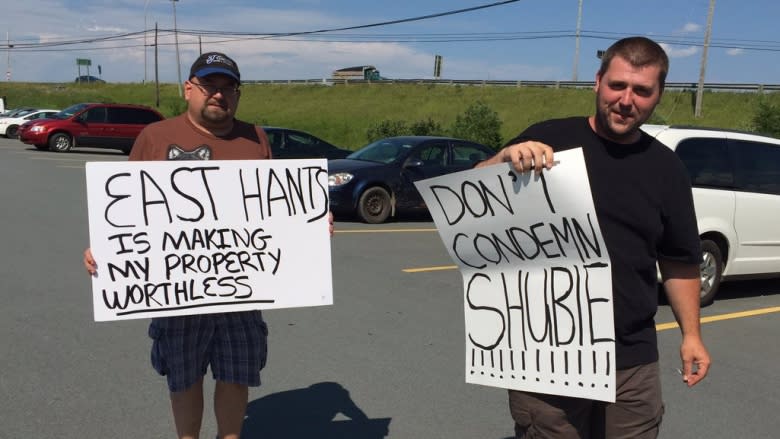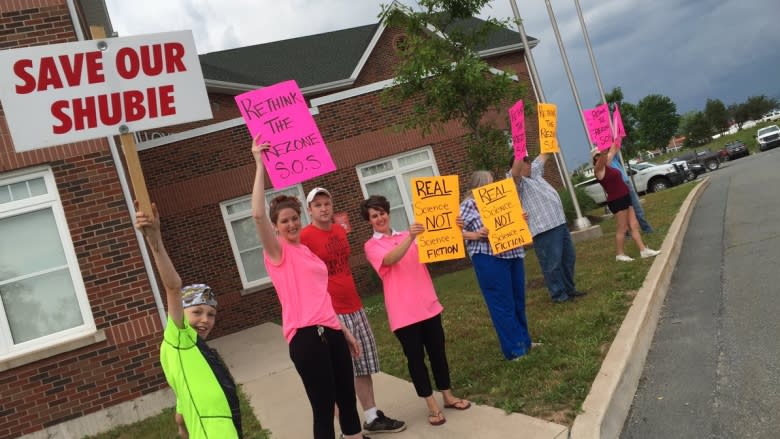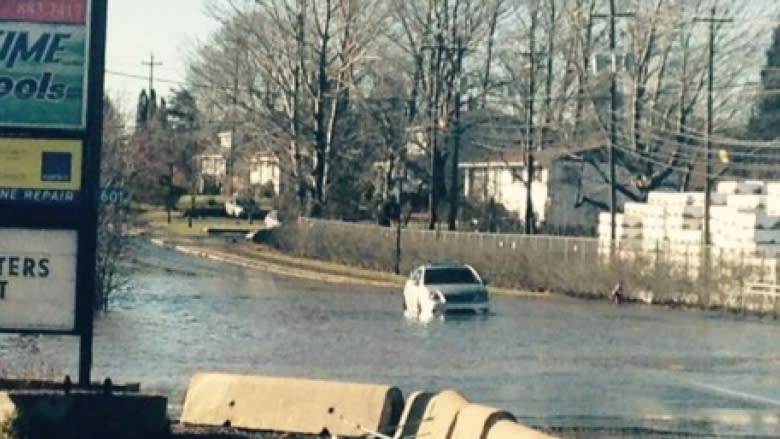East Hants council votes to designate area as high-risk floodplain
The Municipality of East Hants, N.S., voted Wednesday night to rezone a residential area along the Shubenacadie River as a high-risk floodplain, upsetting some residents.
The municipality is seeking to halt new development in the area with an eye toward climate change, while homeowners worry the designation will hurt the value of the approximately 100 affected properties.
Earlier this month, council voted to wait 60 days to get a second opinion on the controversial plan.
It had hoped to get additional input from the province's agricultural and environment departments on a 2013 study by Halifax-based engineering and environment consultants CBCL, which also recommended the floodplain zoning changes.
But both departments refused to get involved, so the vote came sooner than planned.
"We honestly feel that they just kicked Shubenacadie to the curb," said Maranda Julian, whose Mitchell Road property is in the new floodplain zone.
'They just won't listen'
Council did hear an opinion from Tim Webster, a research scientist with the Applied Geomatics Group at Nova Scotia Community College.
Julian said Webster's findings questioned parts of the report including its scope and budget, although overall he supported the study's recommendations.
"But they still went ahead and passed the whole proposal. We know that it is flawed, we have people that have been looking at it. They just won't listen," she said.
The decision is unpopular among some residents, acknowledged John Woodford, the municipality's planning and development director.
"We are compassionate towards the residents of Shubenacadie and understand that decisions like these are tough but based on the best information we had and requirements under the Municipal Government Act, it was the responsible thing to do," he said.
Decreased property values
Julian is a member of Save Our Shubie, a group with 220 members that has been meeting to battle the rezoning proposal.
"It will decrease my property value by 40 per cent, you might as well call it zero. Nobody's going to buy in a high-risk flood zone," she said.
She and her husband bought their house two years ago when the property was designated as being in a moderate flood zone.
"I'm not even sure how it is going to affect my mortgage, my taxes. There was no information on any of this whatsoever," Julian said. She's not sure how her property insurance coverage will be affected. Their house has no history of being affected by a flood, Julian added.
But Woodford said research by the municipality showed there was no difference in real-estate values inside and outside floodplain zones. "What would have more impact is if there was a recent flood."
He added that checks with banks and insurance companies found that getting mortgages and insurance coverage would not be affected by the decision.
No floods in 40 years
Residents can expect more education about the zoning changes, the municipality said Thursday in a news release.
"We will be trying hard to educate the public to ensure they understand how we arrived at our decisions and the importance of identifying environmental issues early and planning accordingly," said Woodford, adding the biggest impact of the decision will be on vacant land in the zone.
"What we are really trying to prevent is new development in the area that we've identified as at risk of flooding."
Council has also requested that planning staff bring a preliminary report on flood-impact mitigation in East Hants to the planning advisory committee, with particular attention being paid to the community of Shubenacadie.
The irony is that Shubenacadie hasn't had a flood in over 40 years, since 1971, Julian said.
"And that involved the perfect storm conditions. It's not something that floods regularly, like the town of Truro. Even Elmsdale floods more than Shubenacadie does."
Woodford said climate change will likely increase the number of floods along the Shubenacadie River.
"That land is susceptible to flooding. The probability is increasing because of that increased sea level."
Going forward
The group wants to work with the municipality to go forward, Julian said. She said members know climate change is affecting water levels and impacting coastal communities.
"Now they're going to talk about mitigation and how it's going to help the residents. The mitigation should have been in the report in the first place. We would want to work with them on this and try to figure out a way to help the people and the municipality."




